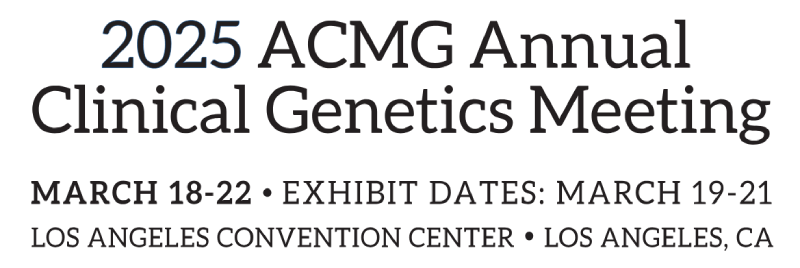Genetic Counselor Forum: Sexual and Reproductive Health Counseling for Individuals with Intellectual Disability
21 Mar 2025
Venue:
Los Angeles Convention Centre
Meeting Room:
502 AB
Health Services and Implementation
-
Accredited:
- Accredited
-
Primary Categories:
- Clinical Genetics
- Health Care Inequities and health disparities
-
Secondary Categories:
- Clinical Genetics
- Health Care Inequities and health disparities
Many within the College are familiar with harmful eugenics policies that included the involuntary sterilization for individuals with intellectual disability (ID). Historically, these policies were supported under the guise of improving the “quality” of future generations by preventing the transmission of “defective genes.” The undertones of these policies evolved over time and were later marketed as advantageous to individuals with ID, mostly women, as a form of contraception to eliminate the risk of unintended pregnancy and the subsequent responsibility of parenthood. (Reilly, 2015)
The incidence of ID is approximately 1%. Many causes of ID are genetic including, but not limited to, Down syndrome, Fragile X syndrome, microdeletion/duplication syndromes, inborn errors of metabolism, etc. Individuals with ID are often viewed as not sexually active, hypersexual or not desiring intimate relationships. These misperceptions often limit access and create barriers to developmentally-appropriate education about sexual and reproductive health and healthy relationships. Additionally, rates of sexual abuse for individuals with ID is significantly higher than that of their nondisabled peers. (Harrell, 2017)
We argue that given genetic counselors’ background in advocacy and patient education, genetic counselors are uniquely suited to be at the forefront of conversations about puberty, sexual and reproductive health, relationships, abuse prevention, etc. (Levy & Packman 2004; Murphy et al, 2016) This session aims to briefly review the history of the eugenics movement and policies regarding sexual and reproductive health for individuals with ID. We plan to address barriers to providing such education within the genetic counseling space, as well as provide tools to support developmentally appropriate conversations across the lifespan. Considerations including addressing parent/caregiver hesitation, adapting conversations depending on the degree of disability (i.e. mild, moderate, severe and profound ID), and available resources and gaps in knowledge/resources will also be discussed. Vignettes will be used to enhance learning. An interview with a couple, both who have an intellectual disability, will further support learning throughout this session.
The incidence of ID is approximately 1%. Many causes of ID are genetic including, but not limited to, Down syndrome, Fragile X syndrome, microdeletion/duplication syndromes, inborn errors of metabolism, etc. Individuals with ID are often viewed as not sexually active, hypersexual or not desiring intimate relationships. These misperceptions often limit access and create barriers to developmentally-appropriate education about sexual and reproductive health and healthy relationships. Additionally, rates of sexual abuse for individuals with ID is significantly higher than that of their nondisabled peers. (Harrell, 2017)
We argue that given genetic counselors’ background in advocacy and patient education, genetic counselors are uniquely suited to be at the forefront of conversations about puberty, sexual and reproductive health, relationships, abuse prevention, etc. (Levy & Packman 2004; Murphy et al, 2016) This session aims to briefly review the history of the eugenics movement and policies regarding sexual and reproductive health for individuals with ID. We plan to address barriers to providing such education within the genetic counseling space, as well as provide tools to support developmentally appropriate conversations across the lifespan. Considerations including addressing parent/caregiver hesitation, adapting conversations depending on the degree of disability (i.e. mild, moderate, severe and profound ID), and available resources and gaps in knowledge/resources will also be discussed. Vignettes will be used to enhance learning. An interview with a couple, both who have an intellectual disability, will further support learning throughout this session.
Learning Objectives
- Describe historical context of reproductive rights of individuals with intellectual disabilities.
- Identify teaching strategies and resources to support conversations on sexual and reproductive health for individuals with ID.
- Address strategies to combat myths and misconceptions about sexual and reproductive health for individuals with ID.
- Validate sexuality and relationships for individuals and couples with ID.
Agenda
-
 Welcome and Introduction3:30 PM – 3:40 PM
Welcome and Introduction3:30 PM – 3:40 PM -

-
 History of Eugenics and Reproductive Policies Specific to Individuals with ID3:40 PM – 3:50 PM
History of Eugenics and Reproductive Policies Specific to Individuals with ID3:40 PM – 3:50 PM -
 Tips and Strategies for Conversations about Healthy Sexuality for Individuals with ID3:50 PM – 4:05 PM
Tips and Strategies for Conversations about Healthy Sexuality for Individuals with ID3:50 PM – 4:05 PM -
 Conversations on Sexual and Reproductive Health (Recorded Interview with a Married Couple and Their Parents)4:05 PM – 4:20 PM
Conversations on Sexual and Reproductive Health (Recorded Interview with a Married Couple and Their Parents)4:05 PM – 4:20 PM -
 Navigating Parental/caregiver Hesitation and Concern4:20 PM – 4:35 PM
Navigating Parental/caregiver Hesitation and Concern4:20 PM – 4:35 PM -
Panel DiscussionPanel Discussion and Q&A4:35 PM – 5:00 PM
-




)
)
)
)
)
)
)
)
)
)
)
)
)
)
)
)
)
)
)
)